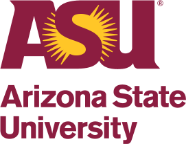This is our new BioKIC social media icon, developed by Jo Ramirez of the SoLS VISLAB, and available for use in any social media context. You can see an example of the icon in use on the BioKIC Twitter account. This blog post serves as resource for downloading the icon.
In addition, we have the "ASU Endorsed Branding Logo" for BioKIC,... Read More
